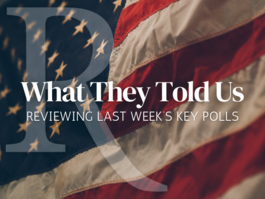Romney's Opponents Look for the Spirit of '76
A Commentary By By Geoffrey Skelley
While Mitt Romney may very well be on his way to winning the GOP nomination, he is not completely out of the woods yet. With so many primaries and caucuses left to be decided, it is perfectly possible that other candidates will win some of the remaining states as long as they stay in the race. We only have to look at the party nomination struggles in 1976 to see how frontrunners who started fast ended up facing long, hard slogs to the nomination.
In 1976 President Gerald Ford faced off in a head-to-head matchup against conservative standard-bearer Ronald Reagan in the Republican field. The incumbent galloped out to a large early lead by winning Iowa, New Hampshire, Massachusetts, Vermont, Florida and Illinois. However, beginning in North Carolina on March 23, Ronald Reagan began winning many states in the South and Midwest. In the end, neither candidate had a clear majority of delegates when they arrived at the Republican convention in Kansas City. Only deference to the sitting (if unelected) president by enough uncommitted delegates allowed Gerald Ford to defeat Reagan for the nomination by a narrow margin.
Meanwhile, on the Democratic side, Jimmy Carter seemed to be gaining the upper hand by early May, having outlasted opponents such as Sen. Henry “Scoop” Jackson of Washington and the Georgian’s chief southern rival, Alabama Gov. George Wallace. However, Carter’s victories in the majority of state primaries and in many state caucuses encouraged the development of an “Anybody But Carter” (ABC) movement among liberal Democrats who worried that Carter was too conservative for the party. The main ABC antagonists proved to be Idaho Sen. Frank Church and Gov. Jerry Brown of California, who each managed to win several states down the stretch. Nevertheless, their candidacies, coupled with that of liberal Rep. Morris Udall of Arizona, were self-defeating, and they split the ABC vote, helping Carter wrap up the Democratic nomination by the early June conclusion of the primary season.
Much like Carter, Mitt Romney has been aided by a fragmented anti-Romney vote in 2012. That is no guarantee that Romney will win all the upcoming contests; at some point, just as we saw 36 years ago, the early frontrunner can lose steam and be defeated in major primaries and caucuses down the road. Maybe the GOP nomination battle this year will effectively end early in South Carolina and Florida, but if it does not, Mitt Romney could take heart from the fact that the candidates who got off to a strong start in 1976, Ford and Carter, ultimately won their nominations. In the challenging marathon of a presidential race, other entrants can catch up to the frontrunner on the track from time to time, but the contender who proved his mettle early on can prove awfully hard to beat at the tape.
Geoffrey Skelley is a political analyst for Center for Politics at the University of Virginia.
See Other Commentary by Larry Sabato
See Other Political Commentary
Views expressed in this column are those of the author, not those of Rasmussen Reports. Comments about this content should be directed to the author.
Rasmussen Reports is a media company specializing in the collection, publication and distribution of public opinion information.
We conduct public opinion polls on a variety of topics to inform our audience on events in the news and other topics of interest. To ensure editorial control and independence, we pay for the polls ourselves and generate revenue through the sale of subscriptions, sponsorships, and advertising. Nightly polling on politics, business and lifestyle topics provides the content to update the Rasmussen Reports web site many times each day. If it's in the news, it's in our polls. Additionally, the data drives a daily update newsletter and various media outlets across the country.
Some information, including the Rasmussen Reports daily Presidential Tracking Poll and commentaries are available for free to the general public. Subscriptions are available for $4.95 a month or 34.95 a year that provide subscribers with exclusive access to more than 20 stories per week on upcoming elections, consumer confidence, and issues that affect us all. For those who are really into the numbers, Platinum Members can review demographic crosstabs and a full history of our data.
To learn more about our methodology, click here.



